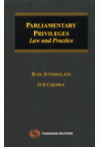- Author(s): Ram Jethmalani, DS Chopra
- Publisher: Thomson Sweet & Maxwell
- Edition: 1 Ed 2015
- ISBN 13 9789384746209
- Approx. Pages 1585 + contents
- Delivery Time 3-5 working days (within Kerala & South India) (Others 7-9 days)
............................................................................................................................
Description
The term 'parliamentary privilege' refers to two significant aspects of the law relating to Parliament: the privileges or immunities of the houses of the Parliament, and the powers of the houses to protect the integrity of their processes, particularly the power to punish contempt. These immunities and powers are very extensive, but they carry with them great responsibilities. They are deeply ingrained in the history of free institutions, which could not have survived without them.
Parliamentary privilege exists for the purpose of enabling the houses of the Parliament to carry out effectively their functions. The primary functions of the houses are to inquire, to debate and to legislate, and parliamentary privilege assists and protects these functions.
The term 'privilege', in relation to parliamentary privilege, refers to immunity from the ordinary law, which is recognised by the law as a right of the houses and their members. Privilege in this restricted and special sense is often confused with privilege in the colloquial sense of a special benefit or special arrangement. The word 'immunity' is best used in relation to privilege in the sense of immunity under the law.
The Legislative Assembly created under Government of India Act, 1919 witnessed a number of instances wherein the privileges of a legislative body were asserted. These include the adjournment motion moved on 21st January, 1927 by Pt. Motilal Nehru to discuss the conduct of the Government in detaining Shri Satyendra Chandra Mitra, an elected member of the House, on the ground that it was a breach of the Privileges of the House and the adjournment motion in the Legislative Assembly moved by Shri Gaya Prasad Singh on 4th September, 1928 against the Editor of the Times of India having made an attack on the President of the House, though disallowed but with the President having held that it is the inherent right of any assembly to defend itself against outside attacks and it is perfectly open in a proper cause for the House to table a substantive motion and pass a vote of censure or condemnation on the attacker.
............................................................................................................................
Contents
Chapter 1 Historical Blackground of Parliamentary Privileges
Chapter 2 Parliamentary Privileges
Chapter 3 Freedom of Speech and Contempt of Court
Chapter 4 Parliamentary Privileges and Fundamental Rights
Chapter 5 Judicial Review
Chapter 6 Parliamentary Privileges and Expulsion
Chapter 7 Parliamentary Privileges and Xth Schedule
Chapter 8 Parliamentary Privileges and Defamation
Chapter 9 Parliamentary Privileges and Preventive Detention
Chapter 10 Parlimentaty Privileges a Comparative Study : Australia
Chapter 11 Comparative Study of Parliamentary Privileges in other Countries : Australia
CANADA
Parliament of Canada Act
Part I : Senate and House of Commons Privileges, Immunities and Powers
Canada Federal Statutes Parliament of Canada Act
Part I : Senate and House of Commons Privileges, Immunities and Powers
South Africa
Powers Privileges and Immunities of Parliament and Provincial Legislative Act, 2004
Index
Chapter 1 Definintion
Chapter 2 Precincts of parliamentary
Chapter 3 Privileges, Immunities, Independence
Chapter 4 Disciplinary action against members for contempt of parliament
Chapter 5 Witnesses
Chapter 6 Publications and Broadcasting
Chapter 7 General
Chapter 8 Provincial Legislatures
Chapter 9 Repeal of Legislation and short title
United Kingdom
House of Lords Act, 1999
Commentary on Sections of House of Lords Act, 1999
USA
The Privileges or Immunities Clause is Amendment XIV, Section I,
Clause 2 of the United States Constitution. It states:
Chapter 12 The Charters of Freedom
Chapter 13 Parliamentary Proceedings (Protection of Publication) Act, 1977
Chapter 14 Parliamentary Privileges Indian Parliament Practice and Procedure
............................................................................................................................
Author's Details
Ram Jathmalani : LL.M., Senior Advocate, Supreme Court of India Member of of Parliament (Rajya Sabha) Former Union Minister for Law and Justice
Prof. D.S. Chopra, B.Sc, LL.M., New Law College, Bharati Vidyapeeth University, Pune
............................................................................................................................

